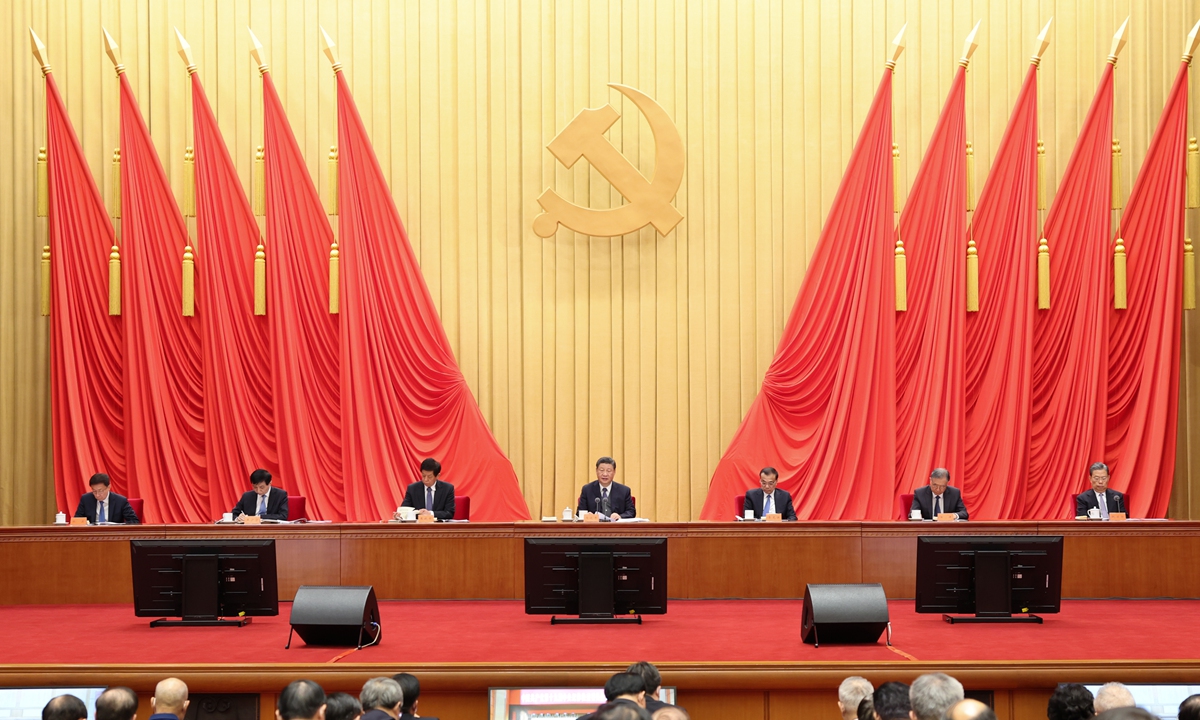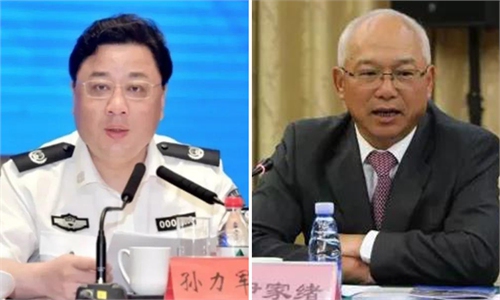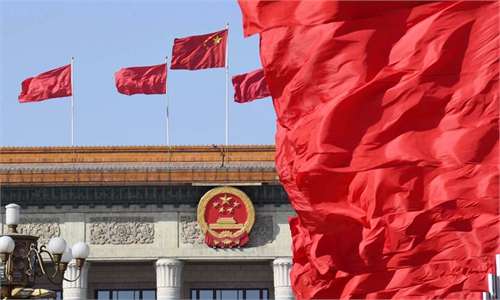CPC’s disciplinary agency renews anti-corruption drive, to fight new challenges of ‘capital-power collusion’

General Secretary of the Communist Party of China (CPC) Central Committee Xi Jinping, also Chinese president and chairman of the Central Military Commission, addresses the sixth plenary session of the 19th CPC Central Commission for Discipline Inspection (CCDI) on Jan. 18, 2022. Members of the Standing Committee of the Political Bureau of the CPC Central Committee Li Keqiang, Li Zhanshu, Wang Yang, Wang Huning and Han Zheng attended the meeting.Photo: Xinhua
The Communist Party of China's (CPC) top disciplinary agency pledged to maintain a strong and persistent crackdown on corruption in a communiqué released Thursday, and the document also said the Party will actively handle "the new challenges and new situations" of the anti-corruption campaign, including strengthening investigations and punishment behind the "disorderly expansion of capital" and monopoly of some online platforms, vowing to cut off the collusion between capital and power.
The communiqué was adopted at the sixth plenary session of the 19th CPC Central Commission for Discipline Inspection (CCDI) in Beijing, held from Tuesday to Thursday, the Xinhua News Agency reported.
Xi Jinping, general secretary of the CPC Central Committee, Chinese president and chairman of the Central Military Commission, attended the plenum and delivered an important speech.
Since the 18th CPC National Congress in 2012, the CPC Central Committee has improved Party conduct, upheld integrity and combated corruption with unprecedented courage and resolve, Xi said at the opening of the plenary session on Tuesday.
Apart from acknowledging the achievements that the Party gained during the anti-corruption campaign in the 10 years since the 18th CPC National Congress, Xi also urged continuous efforts to achieve the strategic goal that officials do not dare, are not able, and have no desire to be corrupt. "We should be aware that the fight against corruption is still raging," Xi stressed.
Xi noted several daunting tasks in the battle, including "guarding against the unwarranted influence of interests groups, preventing officials from falling prey to erosion behavior, identifying and dealing with furtive forms of corruption that employ upgraded methods, eliminating the breeding grounds for corruption, being free of systemic corruption, and defusing risks and hidden dangers."
Analysts said the Chinese people and the world have witnessed the determination and efforts of the CPC to fight corruption in the past 10 years, and the achievements are remarkable with the political environment of China overwhelmingly improved. But the CPC remains calm and vigilant as the anti-corruption campaign has encountered new challenges with the development of society and technology.
The communiqué released on Thursday stressed that the 20th National Congress of the CPC is a significant event for the Party and the country in 2022, and the discipline inspection and supervision work needs to ensure the successful holding of the national congress later this year. During the period of term changing of Party committees at all levels, the atmosphere of term changing needs to be solemn and any act like bribery and cheating that undermines the elections will be investigated and punished.
"Maintain the normalizing presence of the powerful anti-corruption strength… actively deal with the new situations and new challenges of the anti-corruption campaign… show no mercy to the persons who try to build political gangs, 'small circles' and interest groups," said the communiqué.
Zhu Lijia, a professor of public management at the Chinese Academy of Governance, told the Global Times on Thursday that this kind of problem is not new, as in the past, the cases of Zhou Yongkang, Bo Xilai and Ling Jihua show similar characteristics, but every time it comes to the term changing period, the similar problems will reemerge. So the efforts to crack down on such problems cannot be eased.
"This kind of problem is much more serious than economic corruption as it will disrupt the unity of the Party and will undermine the authority of the Party's central committee, and could cause much more serious damage and instability to the country," Zhu said.
The communiqué also stressed that the corruption behind "disorderly expansion of capital" and monopoly of some online platforms should be investigated and punished, and the ties between political power and capital should be cut off.
Zhu said this is a new challenge which emerged in the past 10 years, as the fast development of China's economy has brought huge changes in social media networks, IT industries and digital economy, and some capitalists have gained unprecedented influence as some of their products have become the key parts of public goods of the nation.
Without strict law-enforcement and legislation that keep up with the times, there will be vast space for corruption and misconduct, and the ambition of some capitalists will expand to gain political power and undermine the socialist nature of our country, said analysts.
"The capital is showing its intention to cross the line," said Wu Xinwen, a professor and expert on Chinese politics at Fudan University in Shanghai, noting that some capitalists are no longer satisfied with only having economic power, but intend to expanding their influence to public media and education to eventually gain political power, and without restrictions and management, the capital could overrun politics and society in China.
To overcome this new challenge, and to better manage the development of capital, to keep healthy relations between the government and the private sector, to better use the advantages of capital in China to serve the wellbeing of the people, are key and tough missions for the CPC at present and in the future, analysts said.
The communiqué also said the Party will explore the policy to "blacklist the bribers" and push the "Sky Net anti-corruption operation" to strengthen international anti-corruption cooperation.
Zhu said the "black list" policy for bribers is a new attempt, and the policy could blacklist individuals who have attempted bribery and strengthen the surveillance and supervision over their economic activities and cash flow. This means the anti-corruption measures will be improved and upgraded as well.



